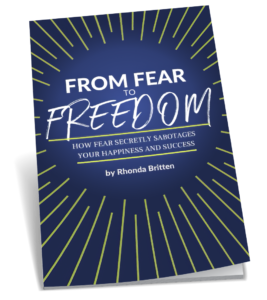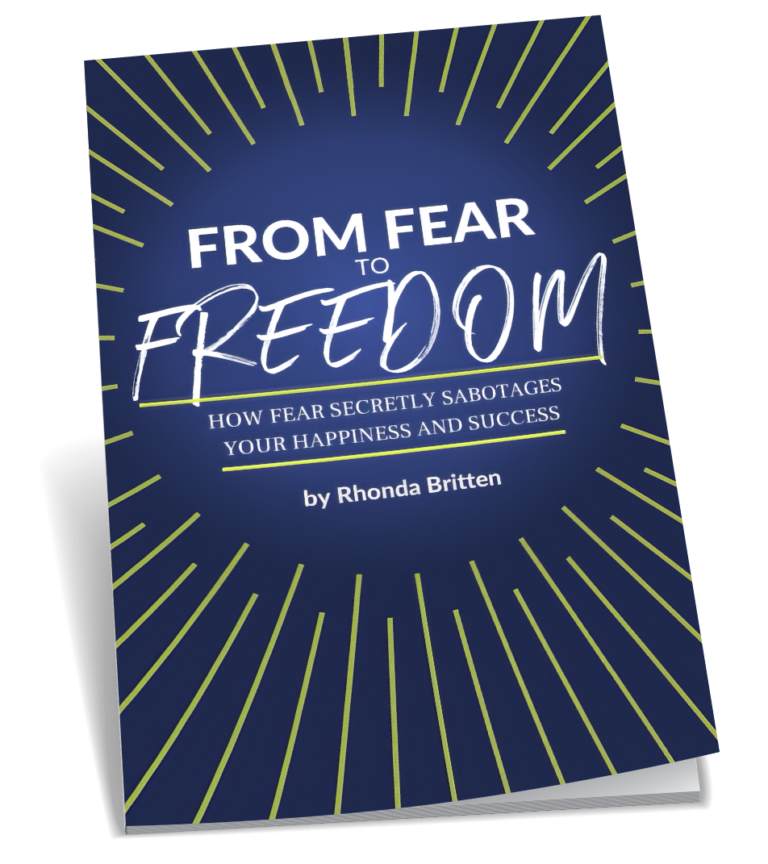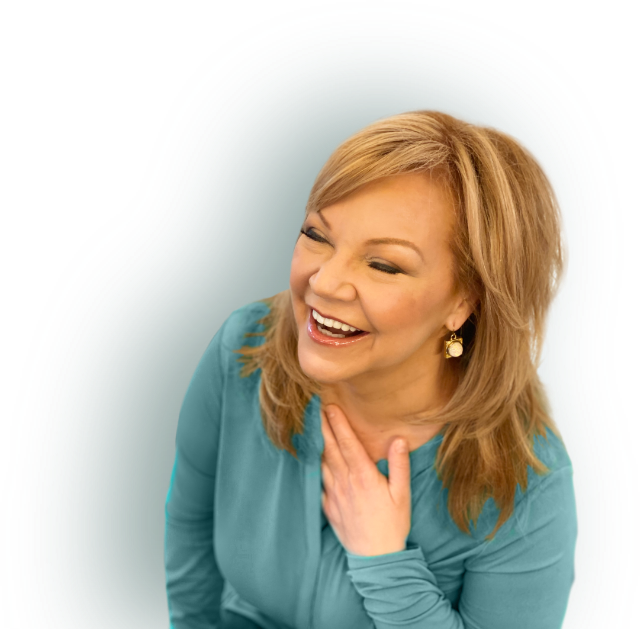Welcome back! Rhonda Britten here, and we’re continuing on with our How to Overcome Fear series. Today’s fear: The Unknown.
Why do humans naturally fear the unknown?
Fear of the unknown is a fundamental fear that all of us are familiar with because the unknown is all around us, and it plays a huge part in our lives.
We don't know what might happen a minute from now. We don’t know what will happen an hour from now. We don’t know what our lives will look like five years from now. We don’t even know for certain what the weather will be like an hour from now. It’s all unknown, which makes our fear of the unknown so ingrained in our lives.
So much of how we respond to the world is based on our ability to respond to the unknown. But just because it’s all around us doesn’t make the fear any less intense. Fear of the unknown can prevent you from taking risks, keep you stuck in the same pattern, and, over time, build up biases towards other people or groups (even without you realizing it.)

In this post, I’ll break down why people fear the unknown and what you can do to manage and overcome this fear. So stick with me!
A Fearless Living Introduction: Overcoming Fear
When many of us think about fear, we think about common phobias, such as a fear of spiders, heights, or public speaking. Of course, these are very real fears, but they’re not the type of fears we speak about at Fearless Living.
At Fearless Living, we focus on emotional fears—the ones that cut deep into the heart of our humanity and mental health. These emotional fears cause us to make decisions, consciously or unconsciously, that push us further and further away from our goals, dreams, desires, and living the life our soul intended.™
The 10 most common emotional fears are:
- Fear of Failure
- Fear of Success
- Fear of Intimacy
- Fear of the Unknown
- Fear of Loneliness
- Fear of Not Being Good Enough
- Fear of Loss
- Fear of Change
- Fear of Being Judged
- Fear of Rejection
I’ll continue to work through all of the fundamental fears we discuss at Fearless Living in more detail here on the blog. For a general overview of each type of fear and the difference between common phobias and emotional fears, read: 10 Common Types of Fear and How to Overcome Them.
Why Do People Fear the Unknown?
Fear of the unknown is technically known as xenophobia. The word is derived from the Greek word “Xenos,” which means ‘foreigner’ or ‘stranger.’ It’s often used to describe bigotry against minority groups based on race, religion, gender, or sexual preference. In these cases, fear of the unknown leads to racism, sexism, homophobia, terrorism, and many more ugly and hateful things.
Sadly, most people don’t even know or realize that their fear of the unknown is what’s fueling their opinions and beliefs. We crave safety so desperately that we begin to develop an “Us” vs. “Them” mentality throughout all aspects of our lives.
But the term has a much broader meaning as well that can apply to any time you step outside of your comfort zone. Xenophobia is the irrational sensation of fear that takes hold when you’re exposed to situations or people you perceive as “other” or foreign.
Fear of the unknown creeps up on us when anything is unfamiliar. It might be a strange environment you’re not used to. It might be a social situation you’ve never been in before. It might be trying something new for the first time.
Your fear of the unknown gets triggered when you are outside of your comfort zone. Your comfort zone is what you know. It’s your home. It’s sitting on the couch watching Netflix while eating your favorite salty snack. It’s driving to work the same way you do every day. It’s familiar and comfortable.
But then, out of the blue, something will trigger fearful responses. You could be going about your normal, run-of-the-mill day commuting to work when suddenly the road you always take is closed. Instead of what is familiar to you, you’re forced to take another route you’ve never taken before, filled with roundabouts. You’re not sure how to use roundabouts. Cue the spiral of fear.
Another example we love to use at Fearless Living is swimming in a pool versus swimming in the ocean. You might be a great swimmer and enjoy swimming at home or at a beach, but what if you were dropped into the middle of the ocean? It’s still water, and you can still swim, so why are your fear senses triggered?
It’s because the ocean is unknown. You don’t know what’s underneath you. You don't know how far you are from shore. And you’re more likely to run into a few slippery surprises. 🦈
Other examples include starting a new job, cooking something you’ve never cooked before, meeting a group of new people, going on a first date, sleeping somewhere that’s not your home, or allowing your kids to go out for the night without you around. Since you’re not familiar with the situation, you can’t predict the outcome. Anything could happen… which means it’s risky. 😱
If your fear of the unknown is triggered every time you are in unfamiliar or uncertain situations, are you going to make smart decisions?
Fear wants to keep you afraid. It’s a mental weight and obstacle that’s incredibly challenging to overcome.
The Connection Between the Unknown and Anxiety
For many people, this fear turns directly into anxiety. Anxiety is triggered by a fear of the future, which is just another way of saying fear of the unknown.
Anxiety affects all of us in different ways and to different extents. I have some clients who suffer from anxiety disorders, clients who have struggled with childhood anxiety disorders that have continued into adulthood, as well as others who have underlying anxiety that isn't as obvious but builds up over time.
Side note: Even if you don’t feel anxiety on a daily or regular basis, it doesn't mean it’s not there. Personally, it’s not something I feel too often anymore 😅, but I know it’s there because it builds and it builds to the point that (luckily only a few times in my life) I experience a panic attack. It’s a scary experience, and for me, it resulted in three false heart attacks. Mental note, Rhonda: TAKE CARE OF YOURSELF! Anyone else need this reminder?
Anxiety disorders can feel so overwhelming that they stop you from taking a risk and choosing yourself. When you feel this way, it’s time to investigate the past. We’ll get to that more below when I share strategies for overcoming your fear of the unknown.
No matter how your anxiety shows up for you, it’s not pleasant, and it can dominate your life.
One of the things I'm so proud of about Fearless Living is how many of my private clients have been able to get off of anxiety medication. Once they learn how to manage their fear and understand the power and opportunity that comes from the unknown, they are able to lower their anxiety without the use of medication.
What Does the Science Say?

Let’s finish this section off with a little bit of neuroscience. Research says that our brains are constantly trying to make predictions about the future. Your brain wants to predict what will happen next. I guess we’re all a little bit psychic!
This comes from our innate human instinct to survive. Our brains troubleshoot possible outcomes to prepare us for what’s around the corner to ensure our survival in the face of the unknown.
But what happens when your brain isn’t able to figure out what will happen—something that happens ALL THE TIME. You can’t put the pieces together. You get uneasy. You feel uncomfortable. You start experiencing fear, which can easily develop into anxiety.
Your brain wants to understand, name, and predict as much as possible. And when it can't do that, fear presents itself. The brain looks at the unknown with fear because what it doesn’t know might possibly harm you—your body, mind, emotional state, etc.
The brain goes: “I don’t know, so it’s probably unsafe!”
Fear is triggered by the unknown because it could lead to its (your) demise—exactly what the brain is trying to prevent by predicting future events. This feeling can become so strong that it actually feels like you are fighting for your life. This is why feelings of fear and anxiety can be so intense and unbearable.
Fear is such a natural human response because it’s how, for many years before modern society, humans protected themselves.
Fear the unknown because the unknown could kill you.
Contemporary models involving uncertainty still make us feel like we’re in danger even when we’re not. Just something being unknown to us is enough to make us believe something bad could happen—even if today that ‘something bad’ looks more like saying the wrong thing during a meeting or looking silly at a dinner party. Is looking silly as serious as being chased by a bear? No, but try telling that to your brain!
As unique and different as we all are, we’re still human. All of us are afraid of the unknown to some extent, and all of us have brains that are trying to navigate the future as best they can.
But knowing we all have this fear response and why it occurs isn’t enough. What can you do to navigate your fear of the unknown? How can you harness the power of possibility to use the unknown to your advantage?
How to Overcome Your Fear of the Unknown
1. Choose to Not Give Into Your Biases
We all have conscious and unconscious biases, but it’s up to you to be aware of them. It’s up to you to prevent them from getting in the way of your rational thinking.
If you’re not willing to be aware of how you behave, how you react, and who you are, then you'll always have a low sense of self-awareness and lack of control over your life. This, in turn, makes you feel powerless and victimized, which feeds into negativity, hate, and forming more biases.
Remember what I said earlier: Sadly, most people don’t even know or realize that their fear of the unknown is what’s fueling their opinions and beliefs.
And when left unchecked, these opinions and beliefs can develop into a destructive “Us” vs. “Them” mentality.
To prevent your biases from taking over, continually check in with yourself. How are you behaving? What biases are forming? Are you acutely aware of who you are and where the opinions you hold are actually coming from?
2. Are You Making it Up, or Is It a Fact?

Fearbuster Exercise™:
It’s time for one of my favorite quick lessons. I remind myself of this small little question on a daily basis. So often, we get caught up believing something is true when we don’t have any facts to back it up. When this happens to me, I ask myself:
Am I making it up, or is it a fact?
I do the same for my clients. Are you making that up, or is it a fact?
I worked with a client who recently came to me saying she was struggling at work because her boss didn’t like her. I stopped her there and said, “Do you know your boss doesn’t like you? Do you have proof that she doesn’t like you?”
While on our Fearless Living journey, it is critical that we ask ourselves the tough questions and be true to what is real and what isn’t.
Are you making it up, or is it a fact?
It might FEEL like your boss doesn’t like you, but do you know that they don’t like you? What proof do you have? Did they tell you they didn’t like you? Have you asked if they don’t like you? Did they tell someone else they don’t like you?
In the case of this client, she didn’t have any real hard proof that her boss didn’t like her, yet she still believed it to be true. What I asked her to do was to start acting like her boss did like her because that was something that actually was within her control. (More on that below.)
Remember the neuroscience we talked about earlier? The brain wants to predict the future to keep you safe. It wants to fill in the blanks so that there are no unknowns. It’s going to make something up from a place of safety. It’s going to tell you a story based on what has happened in the past. Your brain will ally with fear because it wants to keep you safe at all costs.
When you find yourself going down the route of believing someone doesn't like you, something is against you, or you can’t do something for X reason, stop yourself right there.
It’s time to ask: Am I making it up, or is it a fact?
I have so much more to say about facts and feelings, so once you’re done here, I encourage you to check out my other article: Facts Over Feelings: “Am I Making It Up, Or Is It a Fact?”
3. When the Past Creeps Up, Get Grounded in the Present
If your response to an activity, event, or person is disproportionately emotional or aggressive, understand that your response is being triggered by something that occurred in your past.
When you are triggered by something, it’s the past creeping up on you again.
Believe me when I say this has happened to me before. A LOT. I go from 1 to 100 in a matter of seconds, and that’s when I know I need to stop myself. It’s time to ask: Am I making it up, or is it a fact?
For example, when I’ve dated someone in the past, something they do may trigger me to think about my father, who murdered my mother and abandoned me by killing himself at the same time. While difficulties in my romantic relationships are far from this circumstance, that trauma and the fear that comes with it have stuck with me, and it comes up in both expected and unexpected places.
If things aren’t going well, it triggers memories of my father, which can cause me to make that giant leap from 1 to 100. Now even in that moment, I know these two situations are not the same. But the feeling is the same, and that’s enough to trigger me.
I might become irrational, begin leaning into biases, act unlike myself, or go against my own morals and values. But by being self-aware, I can recognize this in myself. When I realize whatever is occurring is about the past, it’s my job to get grounded in the present.
Recognizing that the situation will take time to work through is the first step for me toward making progress. The moment then becomes a learning opportunity to grow, to forgive, to let go, to move on.
4. Know Your Principles and Values Inside and Out
When you are triggered by something (usually something that consciously or unconsciously reminds you of your past), you lose sight of what is rational. In these moments, it can be near-impossible to focus on your values and what truly matters.
It’s so tough to recenter ourselves and navigate our values when we are triggered. But you can give yourself a head start by being clear about your values ahead of time.
What are your values? What type of person do you want to be? What’s most important to you in life? What morals do you stand by?
These are important questions to ask yourself when you are triggered or worried about the unknown.
Ensure you are somewhere safe and comfortable to take the time to flesh out what you value most—your philosophy and guiding light in life. You must have these values set in stone so that you have them to fall back on when something or someone becomes a trigger from your past.
5. Control What You Can and Release the Rest
Repeat after me:
Control what you can and release the rest.
Control what you can and release the rest.
Control what you can and release the rest.
I was working with a client who was an actor. He continually made excuses about the business being against him. He couldn’t get roles because of how he looked or because of other people’s biases or because there wasn't enough work out there for actors. He had all of the excuses. I gave him this exercise.
What about your career is within your control, and what is not within your control?
He could control his headshots and hire a good photographer to take them. He could control the clothes he wore. He could control whether or not he took acting lessons. He could control the people he stayed in contact with. He could control going to networking events to meet the right people. The list goes on.
I had him list everything that was within his control, and then we wrote a list of what he was not in control of. He couldn’t control whether or not he got a role or who was making the hiring decisions. But there was so much more within his control.
Now, the next task was to rate how well he was doing with what he could control. Was he doing the best he could with what was in his control? Not even close. On a scale of 1 to 10 for all the things within his control, he was at 1 or 2, but slowly and surely, that changed. This exercise made him realize that there was so much more he could be doing. The people hiring weren’t out to get him; that was just the story his brain made up to protect him.
The things he was fixated on were out of his control. So let’s go back to our phrase: Control what you can and release the rest.
What are you holding on to that’s not within your control? A false sense of control will only increase your anxiety. When you think you can control what you can’t, your anxiety skyrockets.
You give yourself this false sense of control, but the things you are trying to control are so far outside of what is in your power to change. In letting go of what you can't control, you can release your anxiety—giving yourself so much more power to make positive changes in your life!
6. Go Ahead, Take a Risk!

Let me leave you with one more piece of homework. Get out there and take a risk. If you’re someone who avoids risk factors at all costs, make it a small risk. It’s still a step in the right direction.
We’re afraid of taking risks because of the unknown. We don’t know the result, so our brain says, “No way!” But risks are necessary for our success. Now, I’m not talking about jumping out of an airplane or spending money you don’t have on countless lottery tickets. I’m talking about the risks that help us get ahead in life.
Calculated risks help you reach your dreams and true potential. I wouldn’t be where I am today if it wasn't for taking a huge number of risks. Starting a business is a risk. Asking for a promotion is a risk. Going on a first date is a risk. Saying “I love you” is a risk. But these are all risks that are well worth taking. Without a little risk, there’s no reward.
Risks move you forward in life. But often, we fall into the trap of fear, and we don’t even allow ourselves to take minor risks. Our fear of the unknown is enough to stop us in our tracks before we even try.
Fearbuster Exercise™:
So here’s my task for you: Get out there and try something new. Take a risk, no matter how small. Introduce yourself to someone new, take a salsa dancing class, submit your writing to a writing contest, or share your thoughts at your next meeting. Take one small risk, whatever that might mean for you.
Read my full article to learn How Taking Risks Can Lead You to a Better Life.
Cracking Your Fear of the Unknown With Fearless Living
Cracking the code to your fear of the unknown is only one small aspect of the Fearless Living community. With a Fearless You membership, you’ll gain access to the entire How to Overcome Fear series, which includes the 10 most common fears, including Fear of Loneliness, Fear of Failure, Fear of Success, and more.
The How to Overcome Fear Series will continue to be available to you while you have a Fearless You membership, along with dozens of other courses, lessons, and live sessions. The entire Fearless You library will be at your fingertips, ready to help you live the life your soul intended.™
Learn more about Fearless You and continue following the Fearless Living blog for free weekly content on everything from how to follow your intuition to how to say no to the people you love to identifying fundamental components of fear.
Welcome back! Rhonda Britten here, and we’re continuing on with our How to Overcome Fear series. Today’s fear: The Unknown.
Why do humans naturally fear the unknown?
Fear of the unknown is a fundamental fear that all of us are familiar with because the unknown is all around us, and it plays a huge part in our lives.
We don't know what might happen a minute from now. We don’t know what will happen an hour from now. We don’t know what our lives will look like five years from now. We don’t even know for certain what the weather will be like an hour from now. It’s all unknown, which makes our fear of the unknown so ingrained in our lives.
So much of how we respond to the world is based on our ability to respond to the unknown. But just because it’s all around us doesn’t make the fear any less intense. Fear of the unknown can prevent you from taking risks, keep you stuck in the same pattern, and, over time, build up biases towards other people or groups (even without you realizing it.)

In this post, I’ll break down why people fear the unknown and what you can do to manage and overcome this fear. So stick with me!
A Fearless Living Introduction: Overcoming Fear
When many of us think about fear, we think about common phobias, such as a fear of spiders, heights, or public speaking. Of course, these are very real fears, but they’re not the type of fears we speak about at Fearless Living.
At Fearless Living, we focus on emotional fears—the ones that cut deep into the heart of our humanity and mental health. These emotional fears cause us to make decisions, consciously or unconsciously, that push us further and further away from our goals, dreams, desires, and living the life our soul intended.™
The 10 most common emotional fears are:
- Fear of Failure
- Fear of Success
- Fear of Intimacy
- Fear of the Unknown
- Fear of Loneliness
- Fear of Not Being Good Enough
- Fear of Loss
- Fear of Change
- Fear of Being Judged
- Fear of Rejection
I’ll continue to work through all of the fundamental fears we discuss at Fearless Living in more detail here on the blog. For a general overview of each type of fear and the difference between common phobias and emotional fears, read: 10 Common Types of Fear and How to Overcome Them.
Why Do People Fear the Unknown?
Fear of the unknown is technically known as xenophobia. The word is derived from the Greek word “Xenos,” which means ‘foreigner’ or ‘stranger.’ It’s often used to describe bigotry against minority groups based on race, religion, gender, or sexual preference. In these cases, fear of the unknown leads to racism, sexism, homophobia, terrorism, and many more ugly and hateful things.
Sadly, most people don’t even know or realize that their fear of the unknown is what’s fueling their opinions and beliefs. We crave safety so desperately that we begin to develop an “Us” vs. “Them” mentality throughout all aspects of our lives.
But the term has a much broader meaning as well that can apply to any time you step outside of your comfort zone. Xenophobia is the irrational sensation of fear that takes hold when you’re exposed to situations or people you perceive as “other” or foreign.
Fear of the unknown creeps up on us when anything is unfamiliar. It might be a strange environment you’re not used to. It might be a social situation you’ve never been in before. It might be trying something new for the first time.
Your fear of the unknown gets triggered when you are outside of your comfort zone. Your comfort zone is what you know. It’s your home. It’s sitting on the couch watching Netflix while eating your favorite salty snack. It’s driving to work the same way you do every day. It’s familiar and comfortable.
But then, out of the blue, something will trigger fearful responses. You could be going about your normal, run-of-the-mill day commuting to work when suddenly the road you always take is closed. Instead of what is familiar to you, you’re forced to take another route you’ve never taken before, filled with roundabouts. You’re not sure how to use roundabouts. Cue the spiral of fear.
Another example we love to use at Fearless Living is swimming in a pool versus swimming in the ocean. You might be a great swimmer and enjoy swimming at home or at a beach, but what if you were dropped into the middle of the ocean? It’s still water, and you can still swim, so why are your fear senses triggered?
It’s because the ocean is unknown. You don’t know what’s underneath you. You don't know how far you are from shore. And you’re more likely to run into a few slippery surprises. 🦈
Other examples include starting a new job, cooking something you’ve never cooked before, meeting a group of new people, going on a first date, sleeping somewhere that’s not your home, or allowing your kids to go out for the night without you around. Since you’re not familiar with the situation, you can’t predict the outcome. Anything could happen… which means it’s risky. 😱
If your fear of the unknown is triggered every time you are in unfamiliar or uncertain situations, are you going to make smart decisions?
Fear wants to keep you afraid. It’s a mental weight and obstacle that’s incredibly challenging to overcome.
The Connection Between the Unknown and Anxiety
For many people, this fear turns directly into anxiety. Anxiety is triggered by a fear of the future, which is just another way of saying fear of the unknown.
Anxiety affects all of us in different ways and to different extents. I have some clients who suffer from anxiety disorders, clients who have struggled with childhood anxiety disorders that have continued into adulthood, as well as others who have underlying anxiety that isn't as obvious but builds up over time.
Side note: Even if you don’t feel anxiety on a daily or regular basis, it doesn't mean it’s not there. Personally, it’s not something I feel too often anymore 😅, but I know it’s there because it builds and it builds to the point that (luckily only a few times in my life) I experience a panic attack. It’s a scary experience, and for me, it resulted in three false heart attacks. Mental note, Rhonda: TAKE CARE OF YOURSELF! Anyone else need this reminder?
Anxiety disorders can feel so overwhelming that they stop you from taking a risk and choosing yourself. When you feel this way, it’s time to investigate the past. We’ll get to that more below when I share strategies for overcoming your fear of the unknown.
No matter how your anxiety shows up for you, it’s not pleasant, and it can dominate your life.
One of the things I'm so proud of about Fearless Living is how many of my private clients have been able to get off of anxiety medication. Once they learn how to manage their fear and understand the power and opportunity that comes from the unknown, they are able to lower their anxiety without the use of medication.
What Does the Science Say?

Let’s finish this section off with a little bit of neuroscience. Research says that our brains are constantly trying to make predictions about the future. Your brain wants to predict what will happen next. I guess we’re all a little bit psychic!
This comes from our innate human instinct to survive. Our brains troubleshoot possible outcomes to prepare us for what’s around the corner to ensure our survival in the face of the unknown.
But what happens when your brain isn’t able to figure out what will happen—something that happens ALL THE TIME. You can’t put the pieces together. You get uneasy. You feel uncomfortable. You start experiencing fear, which can easily develop into anxiety.
Your brain wants to understand, name, and predict as much as possible. And when it can't do that, fear presents itself. The brain looks at the unknown with fear because what it doesn’t know might possibly harm you—your body, mind, emotional state, etc.
The brain goes: “I don’t know, so it’s probably unsafe!”
Fear is triggered by the unknown because it could lead to its (your) demise—exactly what the brain is trying to prevent by predicting future events. This feeling can become so strong that it actually feels like you are fighting for your life. This is why feelings of fear and anxiety can be so intense and unbearable.
Fear is such a natural human response because it’s how, for many years before modern society, humans protected themselves.
Fear the unknown because the unknown could kill you.
Contemporary models involving uncertainty still make us feel like we’re in danger even when we’re not. Just something being unknown to us is enough to make us believe something bad could happen—even if today that ‘something bad’ looks more like saying the wrong thing during a meeting or looking silly at a dinner party. Is looking silly as serious as being chased by a bear? No, but try telling that to your brain!
As unique and different as we all are, we’re still human. All of us are afraid of the unknown to some extent, and all of us have brains that are trying to navigate the future as best they can.
But knowing we all have this fear response and why it occurs isn’t enough. What can you do to navigate your fear of the unknown? How can you harness the power of possibility to use the unknown to your advantage?
How to Overcome Your Fear of the Unknown
1. Choose to Not Give Into Your Biases
We all have conscious and unconscious biases, but it’s up to you to be aware of them. It’s up to you to prevent them from getting in the way of your rational thinking.
If you’re not willing to be aware of how you behave, how you react, and who you are, then you'll always have a low sense of self-awareness and lack of control over your life. This, in turn, makes you feel powerless and victimized, which feeds into negativity, hate, and forming more biases.
Remember what I said earlier: Sadly, most people don’t even know or realize that their fear of the unknown is what’s fueling their opinions and beliefs.
And when left unchecked, these opinions and beliefs can develop into a destructive “Us” vs. “Them” mentality.
To prevent your biases from taking over, continually check in with yourself. How are you behaving? What biases are forming? Are you acutely aware of who you are and where the opinions you hold are actually coming from?
2. Are You Making it Up, or Is It a Fact?

Fearbuster Exercise™:
It’s time for one of my favorite quick lessons. I remind myself of this small little question on a daily basis. So often, we get caught up believing something is true when we don’t have any facts to back it up. When this happens to me, I ask myself:
Am I making it up, or is it a fact?
I do the same for my clients. Are you making that up, or is it a fact?
I worked with a client who recently came to me saying she was struggling at work because her boss didn’t like her. I stopped her there and said, “Do you know your boss doesn’t like you? Do you have proof that she doesn’t like you?”
While on our Fearless Living journey, it is critical that we ask ourselves the tough questions and be true to what is real and what isn’t.
Are you making it up, or is it a fact?
It might FEEL like your boss doesn’t like you, but do you know that they don’t like you? What proof do you have? Did they tell you they didn’t like you? Have you asked if they don’t like you? Did they tell someone else they don’t like you?
In the case of this client, she didn’t have any real hard proof that her boss didn’t like her, yet she still believed it to be true. What I asked her to do was to start acting like her boss did like her because that was something that actually was within her control. (More on that below.)
Remember the neuroscience we talked about earlier? The brain wants to predict the future to keep you safe. It wants to fill in the blanks so that there are no unknowns. It’s going to make something up from a place of safety. It’s going to tell you a story based on what has happened in the past. Your brain will ally with fear because it wants to keep you safe at all costs.
When you find yourself going down the route of believing someone doesn't like you, something is against you, or you can’t do something for X reason, stop yourself right there.
It’s time to ask: Am I making it up, or is it a fact?
I have so much more to say about facts and feelings, so once you’re done here, I encourage you to check out my other article: Facts Over Feelings: “Am I Making It Up, Or Is It a Fact?”
3. When the Past Creeps Up, Get Grounded in the Present
If your response to an activity, event, or person is disproportionately emotional or aggressive, understand that your response is being triggered by something that occurred in your past.
When you are triggered by something, it’s the past creeping up on you again.
Believe me when I say this has happened to me before. A LOT. I go from 1 to 100 in a matter of seconds, and that’s when I know I need to stop myself. It’s time to ask: Am I making it up, or is it a fact?
For example, when I’ve dated someone in the past, something they do may trigger me to think about my father, who murdered my mother and abandoned me by killing himself at the same time. While difficulties in my romantic relationships are far from this circumstance, that trauma and the fear that comes with it have stuck with me, and it comes up in both expected and unexpected places.
If things aren’t going well, it triggers memories of my father, which can cause me to make that giant leap from 1 to 100. Now even in that moment, I know these two situations are not the same. But the feeling is the same, and that’s enough to trigger me.
I might become irrational, begin leaning into biases, act unlike myself, or go against my own morals and values. But by being self-aware, I can recognize this in myself. When I realize whatever is occurring is about the past, it’s my job to get grounded in the present.
Recognizing that the situation will take time to work through is the first step for me toward making progress. The moment then becomes a learning opportunity to grow, to forgive, to let go, to move on.
4. Know Your Principles and Values Inside and Out
When you are triggered by something (usually something that consciously or unconsciously reminds you of your past), you lose sight of what is rational. In these moments, it can be near-impossible to focus on your values and what truly matters.
It’s so tough to recenter ourselves and navigate our values when we are triggered. But you can give yourself a head start by being clear about your values ahead of time.
What are your values? What type of person do you want to be? What’s most important to you in life? What morals do you stand by?
These are important questions to ask yourself when you are triggered or worried about the unknown.
Ensure you are somewhere safe and comfortable to take the time to flesh out what you value most—your philosophy and guiding light in life. You must have these values set in stone so that you have them to fall back on when something or someone becomes a trigger from your past.
5. Control What You Can and Release the Rest
Repeat after me:
Control what you can and release the rest.
Control what you can and release the rest.
Control what you can and release the rest.
I was working with a client who was an actor. He continually made excuses about the business being against him. He couldn’t get roles because of how he looked or because of other people’s biases or because there wasn't enough work out there for actors. He had all of the excuses. I gave him this exercise.
What about your career is within your control, and what is not within your control?
He could control his headshots and hire a good photographer to take them. He could control the clothes he wore. He could control whether or not he took acting lessons. He could control the people he stayed in contact with. He could control going to networking events to meet the right people. The list goes on.
I had him list everything that was within his control, and then we wrote a list of what he was not in control of. He couldn’t control whether or not he got a role or who was making the hiring decisions. But there was so much more within his control.
Now, the next task was to rate how well he was doing with what he could control. Was he doing the best he could with what was in his control? Not even close. On a scale of 1 to 10 for all the things within his control, he was at 1 or 2, but slowly and surely, that changed. This exercise made him realize that there was so much more he could be doing. The people hiring weren’t out to get him; that was just the story his brain made up to protect him.
The things he was fixated on were out of his control. So let’s go back to our phrase: Control what you can and release the rest.
What are you holding on to that’s not within your control? A false sense of control will only increase your anxiety. When you think you can control what you can’t, your anxiety skyrockets.
You give yourself this false sense of control, but the things you are trying to control are so far outside of what is in your power to change. In letting go of what you can't control, you can release your anxiety—giving yourself so much more power to make positive changes in your life!
6. Go Ahead, Take a Risk!

Let me leave you with one more piece of homework. Get out there and take a risk. If you’re someone who avoids risk factors at all costs, make it a small risk. It’s still a step in the right direction.
We’re afraid of taking risks because of the unknown. We don’t know the result, so our brain says, “No way!” But risks are necessary for our success. Now, I’m not talking about jumping out of an airplane or spending money you don’t have on countless lottery tickets. I’m talking about the risks that help us get ahead in life.
Calculated risks help you reach your dreams and true potential. I wouldn’t be where I am today if it wasn't for taking a huge number of risks. Starting a business is a risk. Asking for a promotion is a risk. Going on a first date is a risk. Saying “I love you” is a risk. But these are all risks that are well worth taking. Without a little risk, there’s no reward.
Risks move you forward in life. But often, we fall into the trap of fear, and we don’t even allow ourselves to take minor risks. Our fear of the unknown is enough to stop us in our tracks before we even try.
Fearbuster Exercise™:
So here’s my task for you: Get out there and try something new. Take a risk, no matter how small. Introduce yourself to someone new, take a salsa dancing class, submit your writing to a writing contest, or share your thoughts at your next meeting. Take one small risk, whatever that might mean for you.
Read my full article to learn How Taking Risks Can Lead You to a Better Life.
Cracking Your Fear of the Unknown With Fearless Living
Cracking the code to your fear of the unknown is only one small aspect of the Fearless Living community. With a Fearless You membership, you’ll gain access to the entire How to Overcome Fear series, which includes the 10 most common fears, including Fear of Loneliness, Fear of Failure, Fear of Success, and more.
The How to Overcome Fear Series will continue to be available to you while you have a Fearless You membership, along with dozens of other courses, lessons, and live sessions. The entire Fearless You library will be at your fingertips, ready to help you live the life your soul intended.™
Learn more about Fearless You and continue following the Fearless Living blog for free weekly content on everything from how to follow your intuition to how to say no to the people you love to identifying fundamental components of fear.







